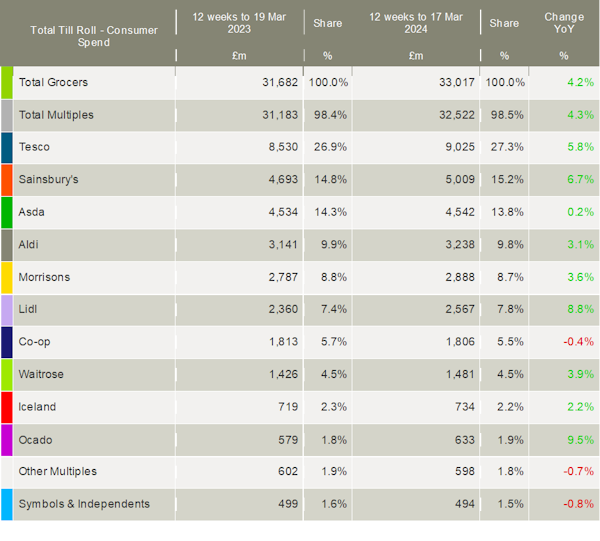Latest data from Kantar shows that take-home grocery sales rose by 4.6% over the four weeks to 17 March, with the early Easter boosting trade as shoppers started stocking up on seasonal treats.
Spring also brought good news for consumers as grocery price inflation eased to 4.5%, the lowest level since February 2022. Fraser McKevitt, head of retail and consumer insight at Kantar, commented: “Grocery inflation has come down significantly since hitting an eye-watering peak of 17% in March 2023. However, despite this continued slowdown, many British households are still feeling the squeeze.” He pointed to a Kantar survey that showed 23% of consumers identified themselves as struggling financially – the same proportion as recorded in November last year.
Shoppers remain on the hunt for value, and among those feeling most pressured, 78% said they are actively buying cheaper groceries, while 68% are using promotions to help manage budgets. Kantar noted that retailers appear to be responding in kind, with the emphasis on discounts and price match schemes continuing this period. £605m more was spent on deals this month than in March last year, while nearly one-third of baskets across Tesco, Sainsbury’s and Asda collectively contained at least one price-matched product.
McKevitt noted that premium own-label lines have been a big beneficiary of consumers trading down, growing by 16.1% this month – the quickest rate in nearly three years. However, after a challenging year, demand for branded goods pushed ahead of own-label overall, increasing sales by 6.1% compared to 4.7% in the latest four weeks.
Ocado was the fastest-growing retailer this month, benefiting from a sustained voucher campaign that helped it attract customers. The retailer improved sales by 9.5% over the 12 weeks to 17 March, ahead of the total online market, which grew by 6.6% to account for 1.9% of all take-home sales. It was the only grocer, other than Waitrose, to boost its number of shoppers in the period.
Meanwhile, Tesco and Sainsbury’s saw their sales climb by 5.8% and 6.7% respectively, with both seeing their share of the market nudging up 0.4 percentage points.
Morrisons achieved a 3.6% increase in sales, marking more than one year of consistent growth for the retailer. Meanwhile, it was another disappointing period for Asda, with its sales increasing by just 0.2% and a further loss of market share.
Aldi’s sales growth slowed to 3.1% (from 5.7% last month), with its market share edging down 0.1 percentage points. Fellow discounter Lidl grew by 8.8% (down from 10.9%), but it continued to capture market share, helped by a 24% rise in sales of baked goods and an 11% jump in fruit, vegetables and salads.
Meanwhile, Waitrose managed to hold its market share steady after a 3.9% increase in sales.




